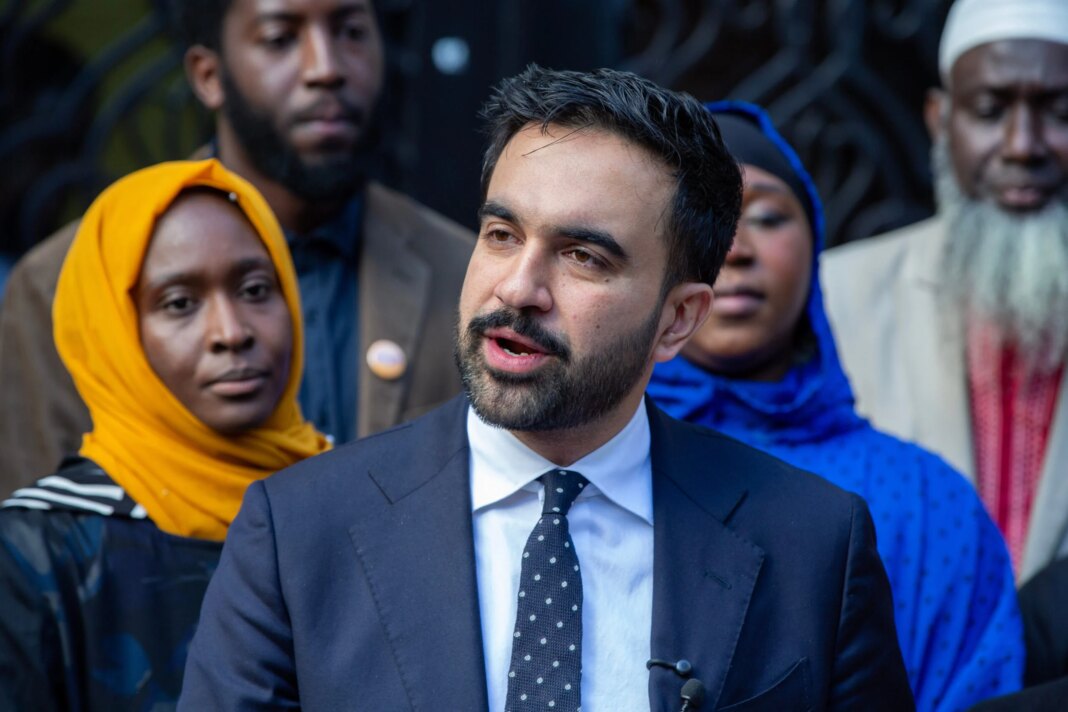Embracing Identity in a Tumultuous Race: Zohran Mamdani and the Struggle Against Prejudice
In the landscape of New York City politics, few recent narratives have sparked as much discussion as that surrounding Zohran Mamdani, the Democratic nominee for mayor. Last week, Mamdani, flanked by faith leaders outside a mosque in the Bronx, made a poignant declaration: he would fully embrace his Muslim identity in response to the increasingly hostile rhetoric from political adversaries, particularly former Governor Andrew Cuomo. Characterizing the attacks as “racist and baseless,” Mamdani’s statements have sparked wide-ranging conversations about identity, inclusion, and the nature of political discourse in a city as diverse as New York.
A Personal Connection to Prejudice
During his speech, Mamdani shared intimate stories from his life that resonated deeply with many in the Muslim community. He recalled his aunt’s choice not to ride the subway after the September 11 attacks, feeling vulnerable in her religious head covering. This narrative of personal experience brought to the forefront the emotional toll of discrimination, especially in a post-9/11 world, where many Muslim New Yorkers have faced similar indignities.
Mamdani articulated a shared experience when he mentioned how an uncle once advised him to keep his faith under wraps upon entering politics. This plea reflects a broader tendency within marginalized communities to suppress aspects of their identity in order to navigate a political landscape that often feels hostile or unwelcoming.
The Political Backlash
The tension surrounding Mamdani escalated dramatically with comments from Cuomo, who accused him of “playing the victim” for political gain and dismissed the idea that Islamophobia exists significantly in New York. Such statements from influential figures can have far-reaching implications, not just for Mamdani’s campaign but for the broader discourse on inclusivity and race relations.
Cuomo’s remarks were not limited to his press conferences. His appearances on conservative media have also raised eyebrows. During one interaction, Cuomo appeared to laugh along with a radio host’s suggestion that Mamdani would be supportive of terrorist acts, drawing concern over the implications of such rhetoric. This exchange highlights the precarious nature of political discourse, where the line between debate and division can become dangerously blurred.
Alarming Smear Tactics
The campaign has seen a worrying trend of smear tactics, with Mamdani being falsely linked to global jihad by opponents like Curtis Sliwa. Such unfounded attacks not only tarnish Mamdani’s reputation but also serve to reinforce harmful stereotypes that affect the Muslim community at large. Cuomo’s campaign, facing allegations of leaning into Islamophobia, intensified this atmosphere of negativity through a now-removed social media post that displayed a video of Mamdani eating with his hands—an overt attempt at ridicule.
These tactics beg the question: how far are political actors willing to go to undermine their opponents?
Reflections on Identity
In light of these challenges, Mamdani has made a conscious choice to openly embrace his Muslim identity, something he initially avoided in his campaign. He hopes that making his faith a central part of his public persona will inspire others in the Muslim community who have felt pressured to remain in the shadows. “I will not change who I am, how I eat, or the faith that I’m proud to call my own,” he affirmed. This declaration is a powerful stance against conformity in the face of prejudice, signaling to New Yorkers that strength can be found in authenticity.
A Broader Message of Unity
Mamdani’s declaration is not just about his own identity; it encapsulates a wider aspiration shared by many within the Muslim community. “The dream of every Muslim is simply to be treated the same as any other New Yorker,” he articulated, challenging the narrative that marginalized groups must ask for less. His assertion that “no more” should Muslims be expected to settle for crumbs of acceptance resonates deeply, particularly among those who have faced systemic inequities.
This call to action reverberates beyond the political sphere, as Mamdani seeks to create a narrative that advocates for equity and justice, emphasizing that the Muslim community, too, deserves full participation in the city’s social and political fabric.
Endorsements and Support
In an unexpected turn, Mamdani has received critical endorsements, including one from House Minority Leader Hakeem Jeffries, which may bolster his position within the often contentious Democratic establishment. This shifting landscape indicates that while challenges remain, support for inclusion and representation is growing.
Combating Myths
Cuomo’s rejection of Mamdani’s narrative that Muslim New Yorkers feel uncomfortable in their own city reflects a broader reluctance among some politicians to acknowledge the lived experiences of marginalized communities. “Don’t tell me New Yorkers are Islamophobic. They’re not,” Cuomo stated, positioning himself in opposition to an increasingly visible conversation about race, religion, and acceptance in New York City.
This disconnect raises important questions about the responsibilities of public figures in addressing issues of polarization and hate, especially as the rhetoric continues to impact not only political fortunes but also the everyday lives of countless individuals.
In this highly charged atmosphere, Mamdani’s journey is emblematic of a larger struggle against prejudice and a push for recognition and respect. His campaign is not merely a bid for political office; it is a clarion call for identity, dignified representation, and unity in a city that thrives on its diversity.



